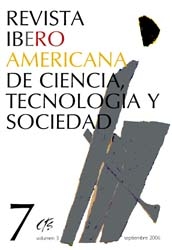Editorial
Resumen
El interés por los procesos de movilidad y migración internacional de personal calificado, así como la preocupación por su dinámica y sus impactos sobre los sistemas nacionales de ciencia, tecnología e innovación son temas recurrentes en la reflexión y en el diseño de políticas públicas en un gran número de países, entre los que se incluyen los de América Latina. Las primeras elaboraciones intelectuales sobre el drenaje de cerebros (brain drain) se remontan a principios de la década de los sesenta, cuando ya eran visibles los efectos de la atracción del sistema científico y tecnológico de los Estados Unidos sobre los profesionales de Europa y de algunos de los países de menor desarrollo relativo. A partir de entonces, el tema experimentó altibajos en la atención recibida, en forma paralela a la visibilidad pública del fenómeno en determinados momentos.
Descargas
Descargas
Publicado
Cómo citar
Número
Sección
Licencia
Derechos de autor 2025 CC Attribution 4.0

Esta obra está bajo una licencia internacional Creative Commons Atribución 4.0.
Todos los números de CTS y sus artículos individuales están bajo una licencia CC-BY.
Desde 2007, CTS proporciona un acceso libre, abierto y gratuito a todos sus contenidos, incluidos el archivo completo de su edición cuatrimestral y los diferentes productos presentados en su plataforma electrónica. Esta decisión se sustenta en la creencia de que ofrecer un acceso libre a los materiales publicados ayuda a un mayor y mejor intercambio del conocimiento.
A su vez, para el caso de su edición cuatrimestral, la revista permite a los repositorios institucionales y temáticos, así como también a las web personales, el auto-archivo de los artículos en su versión post-print o versión editorial, inmediatamente después de la publicación de la versión definitiva de cada número y bajo la condición de que se incorpore al auto-archivo un enlace a la fuente original.











